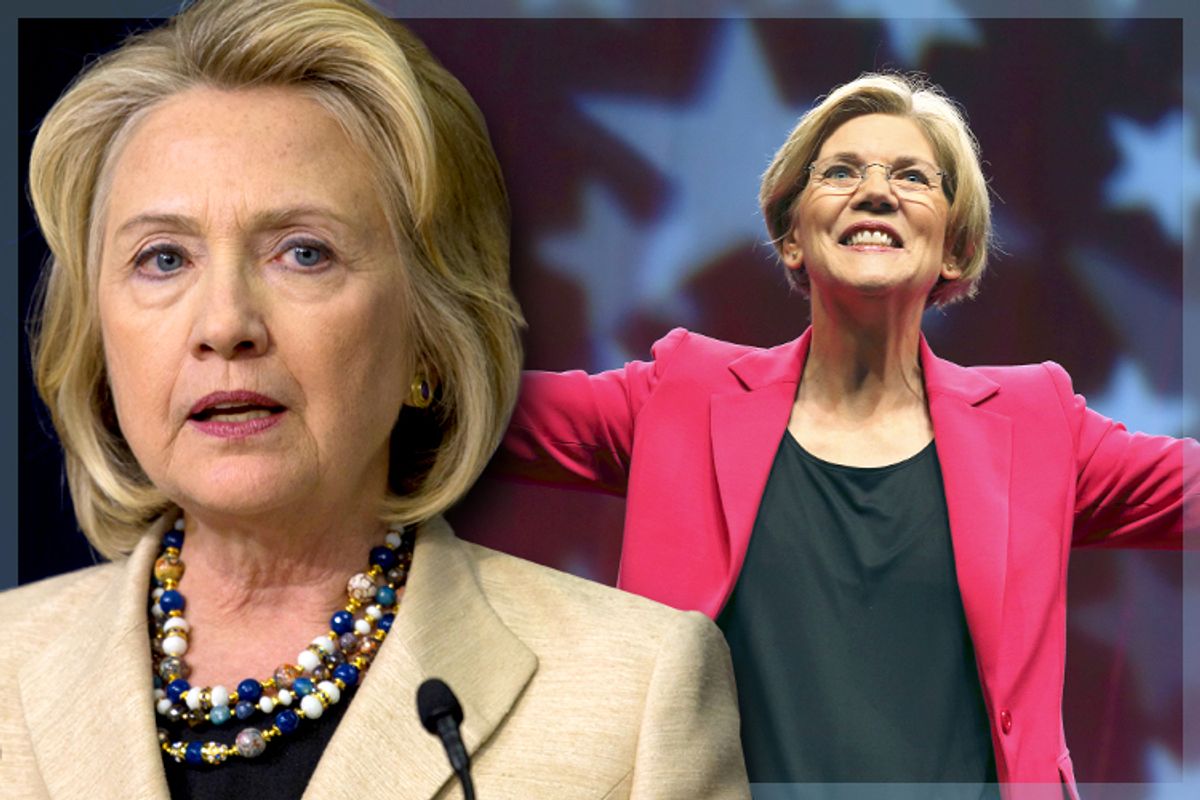Elizabeth Warren is Hillary Clinton's worst nightmare, according to the New Republic. The Democratic Party emerging from the Obama era likes Warren, and her willingness to discuss class and go after the plutocrats, more than it likes Clinton, who has long aligned herself with Third Way types and money people.
Not so fast, says Politico magazine. Those hoping for Warren to lead the Democratic Party's "left turn" will soon find that insurgent candidates rarely accomplish much in presidential primary campaigns, and Clinton will likely withstand a Warren challenge. That's the argument of author Paul Waldman, a contributor to the liberal magazine the American Prospect.
And, well, Waldman's analysis is totally right. He's smart, he gets the history right, and he's careful to avoid falling into the usual traps that bedevil pundits predicting far-off presidential elections. It's true that ideological crusader candidacies almost never beat establishment candidates in presidential primaries. Warren, who has repeatedly said she isn't running, would face tough odds in a campaign against the better-funded, more-famous Hillary Clinton. A non-Warren left-wing candidate's odds would likely be in the Dennis Kucinich range.
But while Waldman is right, he's answering the wrong question. It's not his fault! Most pundits writing about "Warren versus Clinton" are answering the wrong question, because of the political media's fixation on national elections and presidents. But the "economic populism" fight isn't about Hillary Clinton and 2016. It's about the entire Democratic Party and every policy fight and campaign it will be involved in in the foreseeable future.
It's certainly easier to discuss intra-party disagreements about policy and strategy in terms of big clashing personalities, but the people and organizations championing left-wing economic policy and strict financial regulation, from Demos to the Center for Economic and Policy Research, aren't part of a shadow Warren campaign, they're part of a campaign to drag Democrats away from the pro-rich Washington consensus. The point of arguing for more "economic populism" isn't necessarily to take down Hillary Clinton in 2016, though I'd certainly rather have a President Warren than another President Clinton. (Though -- and I say this as a Warren admirer -- she's kind of a blank slate on non-finance issues, right?) Clinton isn't quite inevitable, but aiming immediately for the presidency is in many respects reaching for a symbolic victory before achieving anything substantial. The point of "economic populism" is to fix the Democratic Party at every level.
That's what explains the backlash, which has been growing. Some of it is still couched in terms of Warren vs. Clinton, like David Frum's slightly disingenuous warning that embracing populism will lead inexorably to President Ted Cruz, but something like the Third Way's recent Wall Street Journal Op-Ed is a broad warning, to all Democrats, to avoid all the policies associated with Warren, income inequality, and redistribution.
They're not afraid that Warren will run for president, they're afraid that she'll be so popular that other senators will start acting like her. They're worried that she'll have money to direct to candidates who share her views. They're worried that Warren might embarrass Democrats into passing stricter bank regulations. They're worried that finance's iron grip on the Democratic Party might weaken. The impetus for writing the editorial was Third Way's realization that Warren was sabotaging the decades-long project that turned cutting Social Security into a bipartisan goal. A lot of money and time was spent encouraging elite consensus around "entitlement reform," and suddenly a bunch of senators are talking about making the program more generous. That, of course, is a wildly popular idea, judging by all polling conducted on the subject, but the anti-populism backlash relies on reinforcing the common Washington idea that it is brave to oppose policies most people want and would benefit from. The bankers and CEOs who back Third Way understand that their policy preferences have won out in the Democratic Party in spite of popular opinion.
Conservatives understood this in 1964. They proceeded to take over the entire Republican Party. I think most Warren supporters understand that the goal of "economic populism" isn't getting an economic populist into the White House, but rather to change the way economic arguments are conducted in Washington and by Democratic politicians. The point is to make sure Cory Bookers don't happen anymore.
There's no good reason that reliably liberal states should be electing senators as friendly to Wall Street as Cory Booker. But if you can't stop a Cory Booker, the next best thing is to force him to change his positions to avoid pissing off the base. And there's already some evidence that that's worked on Booker: He quickly reversed his stance on Social Security after pressure from the economic populists.
The goal isn't, and shouldn't be, to block Hillary Clinton. The goal is to make sure a potential President Clinton is beholden to a better Congress and a better Democratic Party.



Shares